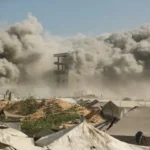The recently held elections left much to be desired in terms of establishing political stability that can lead to macroeconomic stability. This is exacerbated by an attempt to send letters to the International Monetary Fund (IMF) opposing the extension of any fresh credit to Pakistan.
For context, Pakistan Tehreek-e-Insaf (PTI) leader Ali Zafar stated on Thursday that party founder Imran Khan will write a letter to the IMF demanding that it discontinue its support for Pakistan due to “rigged elections”.
The question is why the IMF is being requested to investigate Pakistani elections, and what can the lender of last resort do about it. This was also pointed out by South Asia Institute Director at The Wilson Center, Michael Kugelman.
Pakistan is locked in a cycle of poor growth. Any growth that exceeds the population growth rate can be attributed to increased debt, unless the economy is retooled to shift away from import-financed consumption and toward investment and export-oriented growth.
The fact is that the government requires IMF funding to get through the liquidity issue, which can help with macroeconomic stability. Over the previous five years, compound inflation has exceeded 100%, destroying real earnings and purchasing power throughout the economy. The inability to achieve macroeconomic stability may exacerbate the situation, making the population more exposed to future income and price shocks.
The inability to utilize the facility will drive the country into a higher economic risk situation, perhaps accelerating inflation and causing additional supply chain inefficiencies. In such a case, statements that prolong the availability of funding facilities can be harmful for the economy. Such comments may be considered anti-people and may unintentionally harm the population as a whole – while political maneuvers continue.
The economic situation is precarious. Economic growth during the last fifteen years has been achieved mostly through increased spending, which has been financed largely by debt. The availability of loans to sustain such a growth trajectory will remain constrained.
Pakistan’s economy requires major reforms, and all political and non-political actors must reach an agreement on a road map to steer the country out of a low-growth trap. Political intrigues may continue, but putting the people and the economy at risk will harm people more than anything else.
Such volatility may benefit a few hundred powerful individuals, but it has a significant negative impact on the country’s economic and social outlook. A consensus must be reached, and we may be forced to determine whether the country exists to serve the interests of a few hundred power players and rent-seekers, or the nearly a quarter of a billion people who live there.
Engagement with multilateral organizations and other lenders must be done with extreme caution and procedure in order to maintain the requisite level of trust. The populist slogan that might undermine such confidence adds to an already high level of sovereign risk, making macroeconomic stability even more difficult to achieve.







